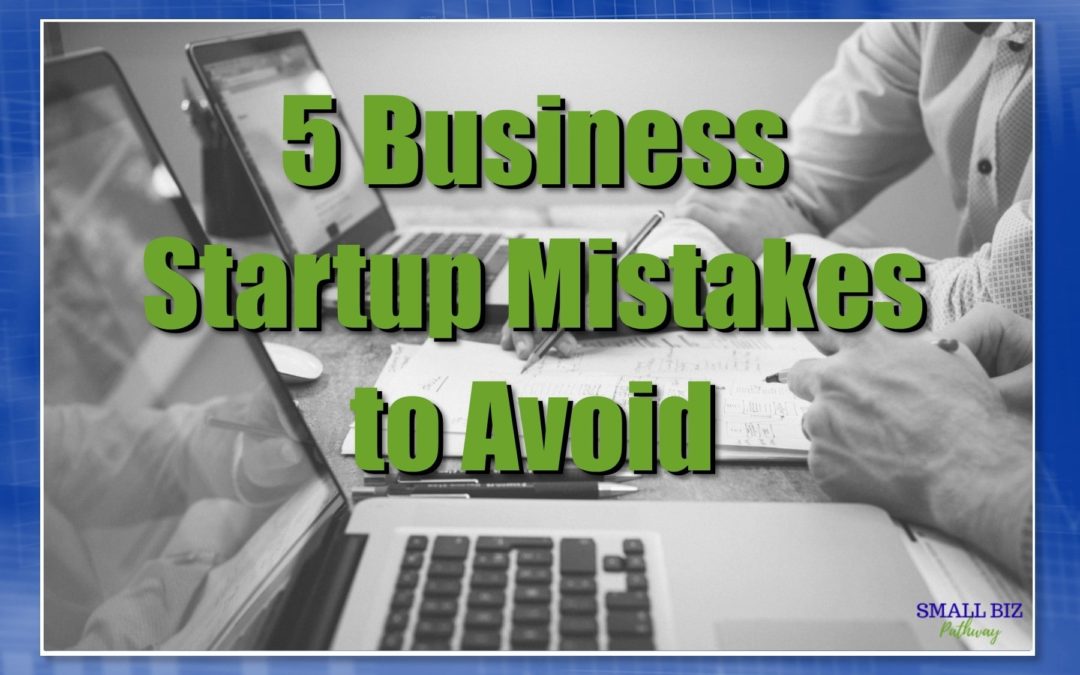5 BUSINESS STARTUP MISTAKES TO AVOID
You’re excited. You have a great business idea. You want to start a business. Everyone you talk to is encouraging.
What could go wrong? According to Forbes, 9 out of 10 startups fail. Why? There are any number of things that can go wrong. A great idea, passion and hard work are a necessity but not merely enough.
Here are 5 business startup mistakes to avoid:
1. FAILING TO RESEARCH AND PLAN.
There are so many things you need to know before starting a business. Even if you’ve worked in the particular industry your business will be in, it’s difficult to know everything. A good start is understanding regulations, local zoning requirements, ordinances, tax laws, etc. Can you imagine what an expensive mistake you could make if you signed a lease for a building before determining if the area was zoned for your type of business? I doubt anyone could afford to pay for a lease without using the building. Or what about paying for signage for your building before determining if there is sign ordinance for that area? It would be a waste of money if you couldn’t use the signs. What about making sales without knowing sales tax regulations? If you don’t collect enough taxes and submit them properly and on time, you can pay penalties and even get shut down.

To avoid business startup mistakes, you must understand regulations, local zoning requirements, ordinances, tax laws and the market AND you must plan for your expenses.
Another crucial thing to research and plan for is the market. How big is the market? Who are the competitors? Who are your potential customers?
If you will have a partner you have to plan and prepare a partnership agreement. Avoid any future conflict by having clear, written expectations.
Depending on your business type, structure and location there will be even more types of things to research and plan for. Take the time to research and plan.
2. BEING UNDER-CAPITALIZED.
Capital is the money needed to operate a business. One step to ensure you’ll have enough capital is to plan for all your expenses: rent, phone, utilities, furniture, fixtures, equipment, inventory, licenses, marketing, insurance, payroll, professional services, etc.
Building a business takes time. Having a “build it and they will come” mentality is a huge mistake. It takes time and hard work to create the revenue needed. Therefore, it’s a good idea to have adequate savings, access to additional capital if needed or even other revenue sources.
For other revenue sources, you may have another job. Maybe you can sublease part of your building. There are other possibilities, as well. The main thing is to realize that it takes time to build a business and you need to be financially prepared for such.
3. OVERSPENDING.
Overspending is something that often happens. Especially if the business owner didn’t fund the business by him- or herself. Whether you have the money for startup or if you get a loan, it will help you to have “skin in the game.” You’ll tend to be more fiscally responsible if you have something to lose personally.
One particular business comes to mind where the businessman borrowed all the money to open his business from a family member. He started treating the business right away like an established business. He overspent in every way you can think of. He spent way too much on advertising; he used t.v., newspaper, radio – everything you can think of and all at the same time upon opening. He over-hired; he hired people for unnecessary positions and he wasn’t willing to put in the long hours himself. He spent a ton of money on the physical appearance, inside and out, of the building he was renting. Guess what? The business failed within a few years. Had he worked harder himself and made wiser spending decisions along the way, the capital may have sustained the business longer while he built the business.
4. MAKING MARKETING MISTAKES.
There are so many marketing mistakes that can be made: spending too much; spending too little; having the wrong marketing mix; not having an online presence; relying only on social media. The list goes on.
The most challenging thing about marketing is that it is always evolving. What worked 10 years ago or even 5 years ago, may not work now. At a minimum, a business needs a website. Most should also have a Facebook presence. Those are two of the places people look first for information about whatever product or service they need. What else will work depends largely on your target audience. For example, if you sell and service hearing aids most of your customers are probably over the age of 60. Therefore, putting messages out on SnapChat or advertising at a college hang-out will probably not be effective.


With marketing, consistency is the key.
Another mistake is trying to be everywhere and do everything in reference to marketing. Especially when starting your business, you cannot effectively manage every social media platform available, such as Facebook, Twitter, Instagram, Pinterest, YouTube, LinkedIn and Google +. Pick a couple and master them. Then add more if it makes sense based on your market.
One complaint I often hear from other business owners goes something like this, “I had an ad on the local radio station but it didn’t help.” It’s hard to determine whether some marketing methods are helping or not. Sometimes your marketing messages are simply helping consumers become familiar with you so that when they do need products or services that you offer, they’ll think of you. Consistency is the key. Keep getting your message out there. Keep making people aware of your brand. When potential customers need what you have to offer, they’re more likely to think of you if you’re consistently marketing your business.
5. BEING INFLEXIBLE.
No matter how much you plan, things are not going to go according to plan all the time. You need to be able to be resourceful, to adjust, to move forward.
No matter how brilliant your business idea, your services and/or your product mix, you may get feedback from customers either based on lack of sales or from suggestions that indicate something needs to change. Maybe you’re not offering a service that you should. Maybe your products are over-priced. Maybe your service isn’t quick enough. It can be any number of things. The important thing is not to be stuck thinking everything about your original idea or what you’re currently doing has to remain exactly as is. Be open to suggestions and being flexible will be invaluable for survival and growth. Also, be aware of shifts and trends in the market and capitalize on those things as you can.
Reading this list and other articles available on the subject will help you prepare to be successful. If you’re going to start a business you’re probably already optimistic and passionate about your idea which will help you in so many ways. But, optimism, passion and a good idea will not prevent common startup mistakes. To avoid the mistakes listed in this article, as well as others, remember to research, plan, have adequate capitalization, spend responsibly, market your business according to your target audience, and be flexible.
A Good resource of information is the U.S. Small Business Administration which includes Small Business Development Centers in communities throughout the United States. While you can gain a wealth of information from their websites, you can also often find valuable nearby classes and workshops that will help you with all phases of your business, including startup.
Are you a business owner? Can you provide a tip? Or are you planning to start a business and have a question? Please leave your comments!
And, don’t forget to get this FREE LIST OF 40 WAYS TO PROMOTE YOUR BUSINESS . . .
"40 Ways to Promote Your Business"
Get your FREE COPY of "40 WAYS TO PROMOTE YOUR BUSINESS"
The following two tabs change content below.


Sondra Kirtley, MBA, is an entrepreneur who owns and operates a retail and service business in Eureka, California. Known for her helpful nature and small business expertise, Sondra founded SmallBizpathway.com to share tips and experiences with other small business owners.
Latest posts by Sondra Kirtley (see all)
- Small Business Survival during the Pandemic - February 28, 2021
- HOW TO INCREASE SALES WITH SUGGESTIVE SELLING - February 21, 2021
- “WOW” YOUR CUSTOMERS WITH THANK YOU CARDS - February 15, 2021


Leave a Reply